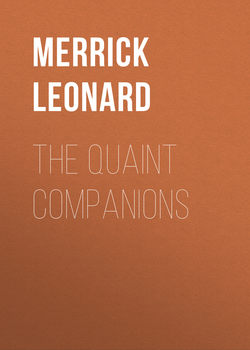Читать книгу The Quaint Companions - Merrick Leonard - Страница 2
INTRODUCTION
ОглавлениеThe chief fault of The Quaint Companions is that it ends. Mr. Merrick is no follower of the "well-made novel" school; he accepts his liberties as an English novelist, and this book has not only the beginning and middle and end of one story, but the beginning and some of the middle of another. The intelligent reader would be the gladder if it went on to that second end, and even then he might feel there was more to be said. For this book is about the tragedy of racial miscegenation. It is, perhaps, the most sympathetic and understanding novel, in its intimate everyday way, about the clash of colour and race-prejudice and racial quality that has ever been written in English, and its very merits make its limitation of length and scope the more regrettable. It is not a book to read alone. One should go from it to Le Chat Maigre of M. Anatole France; and good collaterals to it would be Mr. Archer's Through Afro-America and Mr. Hesketh Prichard's Where Black rules White.
On the whole the strength of the book lies rather in the earlier part of it. Elisha Lee is the realest, most touching individuality in this little piebald group of second-rate humanity. He has, as the vulgar way of the studio puts it —guts. When he is hurt he swears, and the heart of the reader responds. David Lee is a weakling, diffusing a weakness over all the story of his development. The story loses spirit as he replaces his father. He is sensitive without strength, and expressive without pride. He writes. He wields what is ultimately the most powerful weapon a man can take into his hand, the pen. He has, we are told, the moving touch. What more is needed for pride and happiness? Apparently the normal gratification of a healthy guinea-pig. All Mr. Merrick's skill will not reconcile us to the pathos of David's disappointment at the loss of a pretty fool, or make us see in him and Bee anything more than two unreasonably despondent beings who have merely to look up to rejoice in the gifts of understanding they possess. This second story is not a tragedy, but a misunderstanding, and when Mr. Merrick should begin to elucidate that, when, indeed, he has just got to the gist of his enthralling subject and brought his Quaint Companions together, he sounds a short unjustifiable note of sentimentality – and ends.
Since 1900 when Mr. Merrick closed this story eighteen years have passed. It is now possible to tell a little more of the fate of Bee and David. They did come into closer juxtaposition even as Mr. Merrick fore-shadowed. Indeed, availing themselves of the wilder courage of these latter days, they married. They had no children. Bee developed a practical side that was extraordinarily sustaining to David. She learnt to write and he, adventuring beyond the delicacies of his earlier days, began to produce short fantastic pieces of fiction that had an immense vogue in America…
But why confine ourselves to the limit of 1918? Let us glance on a few years. David's long-deferred success was now at hand. The younger generation hailed him with the utmost delight, his name became almost a symbol for the revolt against the lengthy, crowded novels of Bennett, Merrick, Wells, Cannan, Compton Mackenzie and their elderly contemporaries. David was inordinately praised by the aged but still active Yeats, and elected an original member of the New Academy of Literature which had just received its charter. Mr. Gosse was extremely nice to him… David's slight melancholy, his effect of ill-usage patiently borne has never quite deserted him, and the subtle charm of Bee's crumpled sweetness became more and more recognisable with the passing of the years…
Perhaps, like the sailor who wanted to fight the villain of the play, I have been a little carried away by the reality of the figures before me. How real these people are! So real are they that one can take them out of their author's hands and look at them in another light and not destroy them. That is a very good test of created reality. Elisha Lee is a memorable and unique figure. He stands for something that has never been done in fiction before, and he is done so well that he must necessarily become a type in our memories. He lives in my mind just as Micawber or Peter Quint live. And I would never be surprised to find myself in a railway carriage with Mrs. Lee and his stepson. How disagreeable they would make the journey! Bee I did actually see the other day, in the Hampstead tube; she did not look up, but I knew that it was Bee. And how admirable, too, is Professor Sorrenford and his comic opera!
But why go on? Yielding to a modern convention among publishers that good wine needs a bush, and being eager to set my admiration for and interest in Mr. Merrick on record, I have written this. But having subscribed my testimony, I very cheerfully gesture the reader on to the book.
H.G. WELLS.
